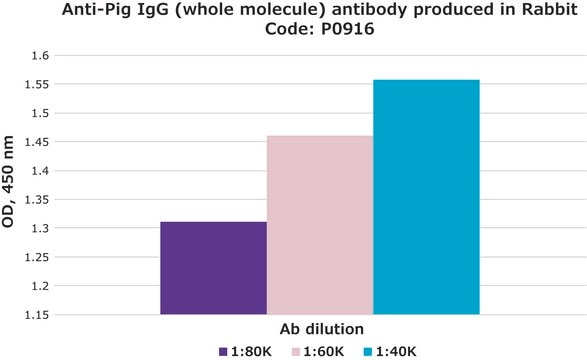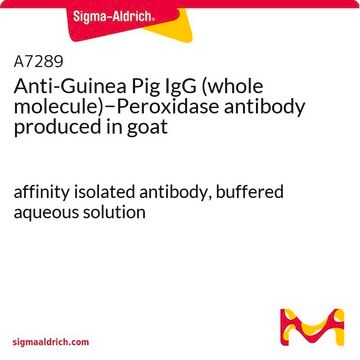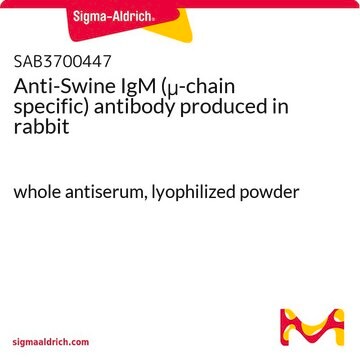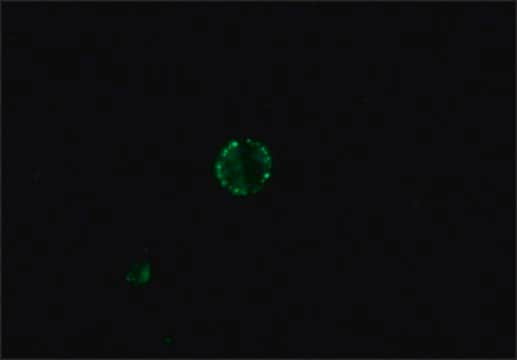추천 제품
생물학적 소스
rabbit
결합
FITC conjugate
항체 형태
affinity isolated antibody
항체 생산 유형
secondary antibodies
클론
polyclonal
형태
buffered aqueous solution
저장 조건
protect from light
기술
direct immunofluorescence: 1:32
저장 온도
−20°C
타겟 번역 후 변형
unmodified
유사한 제품을 찾으십니까? 방문 제품 비교 안내
관련 카테고리
일반 설명
Immunoglobulin G (IgG) is a glycoprotein antibody that regulates various cellular immunological responses. Pig IgGs are involved in mediating several pathogenic responses, including the response to Trichinella infections . Anti-Pig IgG (whole molecule)−FITC antibodies can be used to study the detection and localization of pig IgGs. The product is specific for pig IgGs.
Pig IgG is a plasma B cell derived antibody isotype defined by its heavy chain. IgG is the most abundant antibody isotype found in pig serum.
특이성
Rabbit polyclonal anti-Pig IgG (whole molecule)?FITC antibody reacts with pig IgG in vitro, in pig serum and biological fluids.
면역원
Purified pig IgG
애플리케이션
Anti-Pig IgG (whole molecule)-FITC antibody is suitable for use in direct immunofluorescence (1:32).
Anti-Pig IgG (whole molecule)-FITC antibody produced in rabbit has been used in indirect immunofluorescence assay.
Rabbit polyclonal anti-Pig IgG (whole molecule)−FITC antibody may be used to detect and quantitate the level of IgG in pig serum and biological fluids by fluorescent techniques. It may also be used as a secondary antibody in assays that use pig IgG as the primary antibody.
생화학적/생리학적 작용
IgG antibody is the most abundant serum antibody among immunoglobulins of the immune system. It is found in blood and in extracellular fluid when exposed to an antigen. It protects from bacterial, fungal and viral infections. Maternal IgG crosses from mother to fetus through the placental barrier by pinocytosis to provide passive immunity for the neonate and protect against infections.
IgG crosses the placental barrier, is a complement activator and binds to the Fc-receptors on phagocytic cells. The level of IgG may vary with the status of disease or infection. Fluorescein isothiocyanate (FITC) is a fluorescein derivative (fluorochrome) used to tag antibodies, including secondary antibodies, for use in fluorescence-based assays and procedures. FITC excites at 495 nm and emits at 521 nm.
물리적 형태
Solution in 0.01 M phosphate buffered saline, pH 7.4, containing 15 mM sodium azide.
저장 및 안정성
For continuous use, store at 2-8 °C for a maximum of one month. For extended storage, the solution may be frozen in working aliquots. Repeated freezing and thawing, or storage in "frost-free" freezers, is not recommended. If slight turbidity occurs upon prolonged storage, clarify the solution by centrifugation before use.
면책조항
Unless otherwise stated in our catalog or other company documentation accompanying the product(s), our products are intended for research use only and are not to be used for any other purpose, which includes but is not limited to, unauthorized commercial uses, in vitro diagnostic uses, ex vivo or in vivo therapeutic uses or any type of consumption or application to humans or animals.
Not finding the right product?
Try our 제품 선택기 도구.
Storage Class Code
10 - Combustible liquids
WGK
nwg
Flash Point (°F)
Not applicable
Flash Point (°C)
Not applicable
개인 보호 장비
Eyeshields, Gloves, multi-purpose combination respirator cartridge (US)
시험 성적서(COA)
제품의 로트/배치 번호를 입력하여 시험 성적서(COA)을 검색하십시오. 로트 및 배치 번호는 제품 라벨에 있는 ‘로트’ 또는 ‘배치’라는 용어 뒤에서 찾을 수 있습니다.
Chunyun Qi et al.
iScience, 25(10), 105268-105268 (2022-10-25)
Classical swine fever virus (CSFV), a classic swine fever pathogen, causes severe economic losses worldwide. Poly (rC)-binding protein 1 (PCBP1), which interacts with Npro of CSFV, plays a vital role in CSFV growth. We are the first to report the
A temporal model of human IgE and IgG antibody function
Collins AM and Jackson KJL
Frontiers in immunology, 4, 235-235 (2013)
Guanylate-binding protein 1, an interferon-induced GTPase, exerts an antiviral activity against classical swine fever virus depending on its GTPase activity
Li LF, et al.
Journal of virology, 90(9), 4412-4426 (2016)
K Nöckler et al.
Veterinary parasitology, 163(4), 341-347 (2009-05-29)
Human trichinellosis is a foodborne disease caused by ingestion of infective Trichinella muscle larvae via pork or meat of other food animals which are susceptible to this zoonotic parasite. There are new approaches for a risk-oriented meat inspection for Trichinella
Changchao Huan et al.
Viruses, 14(8) (2022-08-27)
Pseudorabies virus (PRV) is one of the most important pathogens causing serious diseases and leads to huge economic losses in the global swine industry. With the continuous emergence of PRV variants and the increasing number of cases of human infection
자사의 과학자팀은 생명 과학, 재료 과학, 화학 합성, 크로마토그래피, 분석 및 기타 많은 영역을 포함한 모든 과학 분야에 경험이 있습니다..
고객지원팀으로 연락바랍니다.








